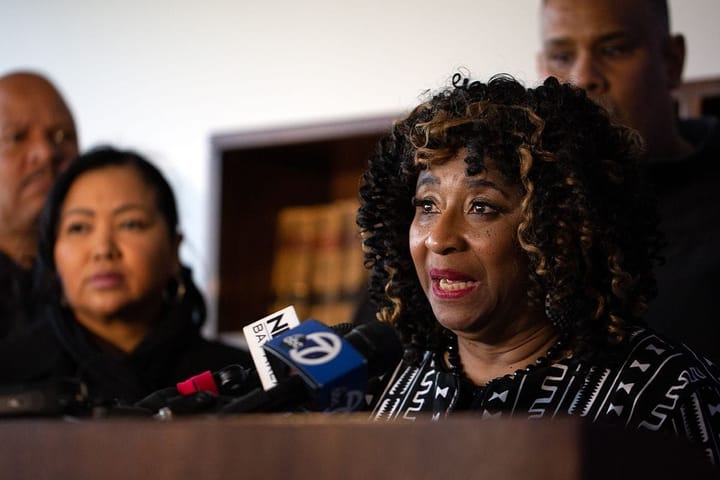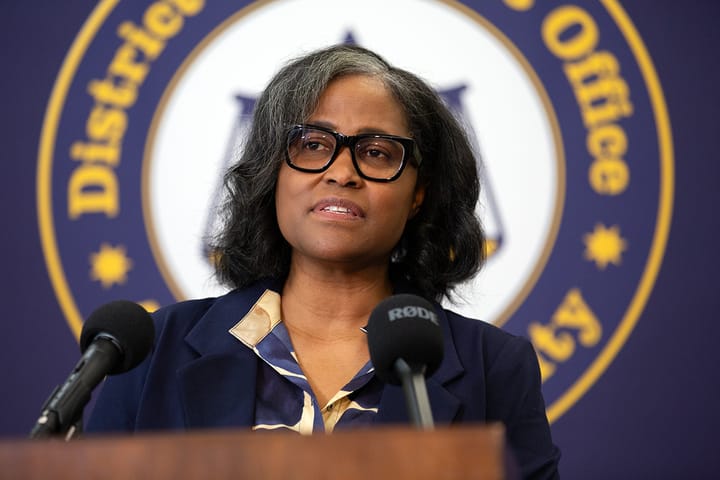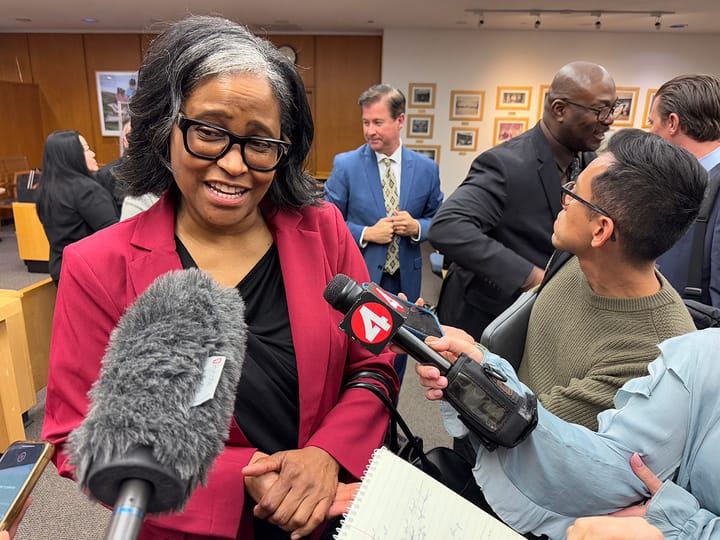Man held to answer in fatal shooting of Cal basketball great
Dashcam footage from other drivers helped the CHP identify suspect Juan Angel Garcia, then 25, in the death of Gene Ransom.
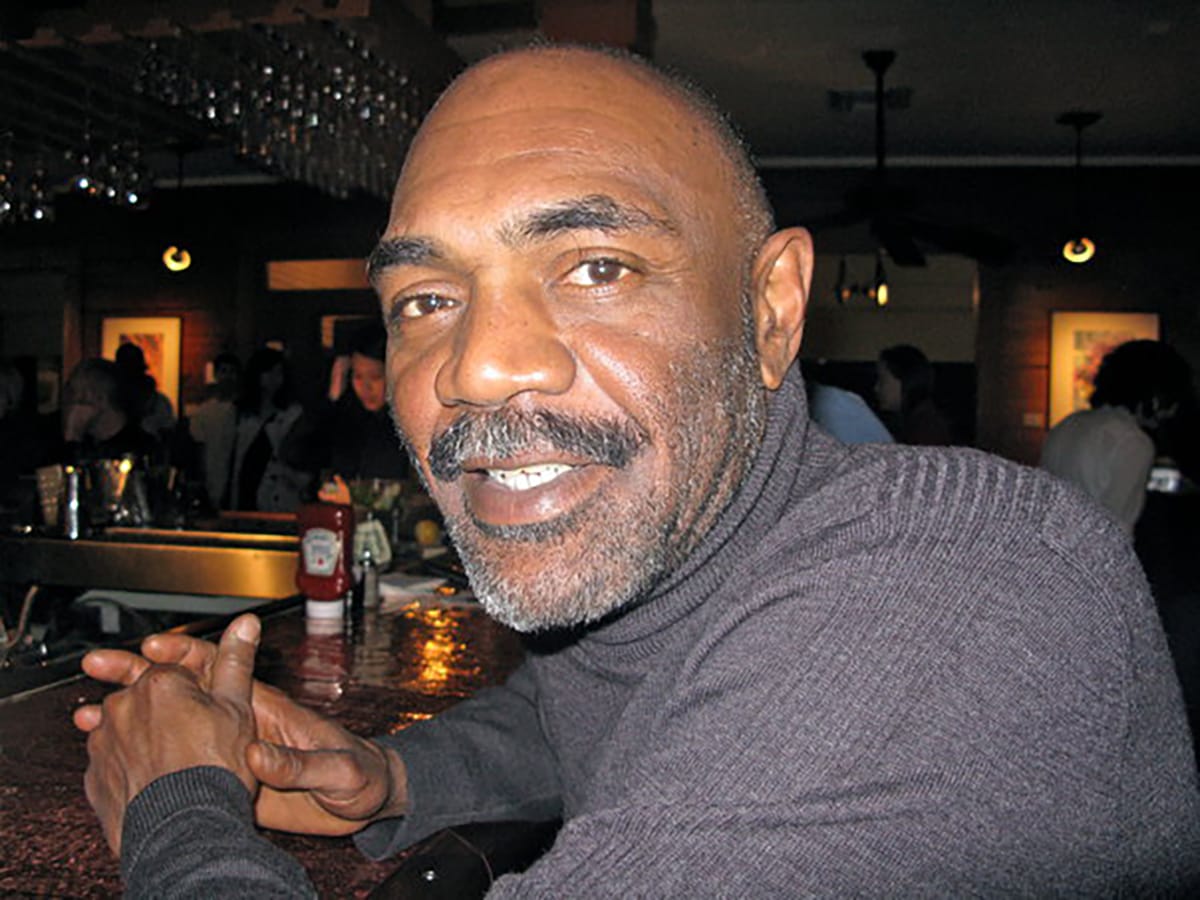
The man charged with the murder of Berkeley basketball legend Gene Ransom in a freeway shooting in 2022 has been ordered to stand trial, court records show.
Ransom first won acclaim as an athlete at Berkeley High in the 1970s and went on to play basketball for Cal. He was later inducted into UC Berkeley's Hall of Fame as one of its top point guards.
Ransom was driving alone on the freeway on Feb. 4, 2022, when a stranger pulled up beside him and shot him. The 65-year-old was pronounced dead at the scene after crashing near the Oak Street exit on northbound I-880 in Oakland.
Ransom's death sent shockwaves through the Bay Area as people remembered his many contributions as a local star athlete who went on to become a longshoreman and a coach.
Dashcam footage from two passing motorists helped the California Highway Patrol identify suspect Juan Angel Garcia, then 25.
Officers arrested Garcia less than 24 hours after the shooting at his home in San Francisco. He was still wearing the same maroon sweatshirt emblazoned with the word "Cookies" that he had worn when he killed Ransom, the CHP said.
Garcia had no prior criminal record but had a pocket full of bullets when he was arrested, according to court testimony. Officers also found two magazines and a speed loader when they searched his home.
Garcia has been in custody at Santa Rita Jail, held without bail, ever since his arrest on Feb. 5, 2022.
The CHP never found the murder weapon, but prosecutor Raul Jacobson argued in court that Garcia was spotted stopping on the Bay Bridge after the shooting and had likely tossed the gun into the water.
The CHP did find a spent shell casing when they searched Garcia's car, according to court testimony.
But Jacobson said the single bullet retrieved from Ransom's body had been "too mangled to be tested" for comparison.
Garcia's preliminary hearing, where a judge hears some of the evidence to determine if a case should proceed to trial, took place over two days in February and April.
The Scanner did not attend the hearing, but reviewed a transcript of it when it recently became available, to report this story.
According to court testimony, Ransom had cut off Garcia in the fast lane, forcing the younger man to hit the brakes.
On the stand, CHP Detective Eric Bulger described the unsafe lane change as simply "an infraction."
In response, the detective said, Garcia pulled to the left and sped up the shoulder to catch up with Ransom. When he reached him, he fired into Ransom's car, striking him in the neck, the detective said.
Ransom's Honda crashed nearby and Garcia continued home to San Francisco, Bulger said.
Officers found no weapons in Ransom's car and no evidence that he had been armed.
Garcia's attorney, Brian Amaya, argued that Ransom had cocaine and marijuana in his system and "should not have been on the road" that evening.
Ransom had struggled with addiction and had also sought treatment.
Amaya said Ransom was speeding and had changed lanes a number of times before the shooting.
Amaya said Ransom "tried to run Juan Angel off the road" and claimed he had "pulled out a gun and threatened Juan Angel."
Authorities found no weapon at the scene, Amaya argued, because it was a "high crime area" and it took the CHP 13 minutes to get to arrive.
He said anyone could have accessed Ransom's vehicle and taken the firearm during that period.
"This was a clear act of self-defense," Amaya told the court. "The decedent was the one chasing Juan Angel down, not the other way around."
Prosecutor Jacobson scoffed at the self-defense theory, which Amaya put forward during closing arguments.
"The victim is not chasing the defendant down. He's trying to get around him. The defendant is the one that follows after him and chases him down, and then shoots and kills him," Jacobson said. "There's no evidence that the victim had a gun, pulled a gun. That's all made up."
Jacobson continued: "Cutting someone off on a freeway is not a justification to shoot and kill. There's no evidence of self-defense whatsoever."
Jacobson said Garcia's cellphone records also put him at the scene during the fatal shooting and that a criminologist had found gunshot residue in his car and on his maroon "Cookies" sweatshirt when it was later tested.
Judge Thomas Stevens ultimately held Garcia to answer on both charges against him: murder and shooting at an occupied vehicle, as well as special allegations related to the use of a firearm.
"The video and the arguments and the evidence speaks for itself, so I'm not going to try to summarize it here," Stevens said from the bench.
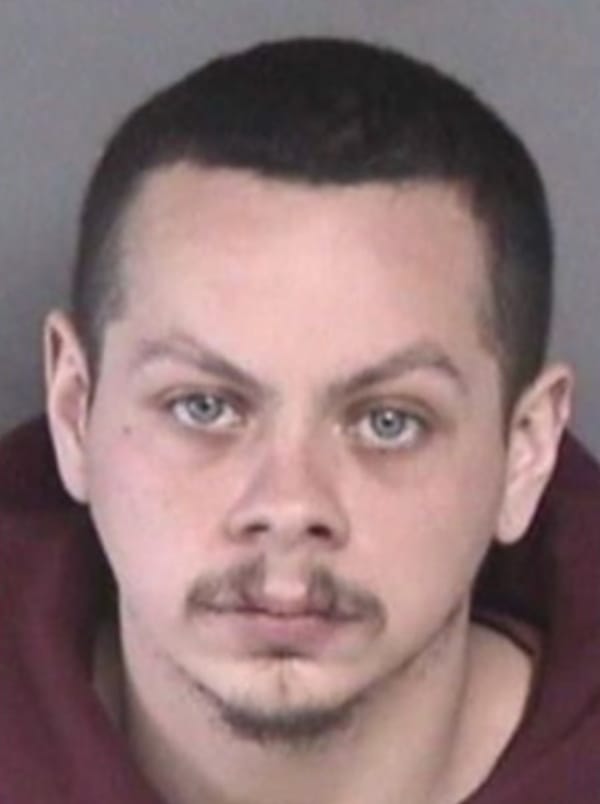
Juan Angel Garcia. ACSO
After making his closing arguments, Amaya also argued that Garcia should be eligible for release on bail, particularly in light of his clean record.
"He has been a model citizen and has experienced quite a bit, and still at the same time of this incident was working and paying rent and doing all the things that a normal individual does," Amaya told the court. "I would argue that what happened in … a minute of his life fails to compare in a balancing test to the 25 years of life that he had spent following most of the rules."
He said his client should be freed on an ankle monitor pending trial.
Judge Stevens acknowledged that Garcia's clean record was "unusual in a case like this" and said it was "a strong factor in mitigation."
But he said it was also worth noting that Garcia had apparently been driving around with a loaded gun, and was arrested the next morning with a pocketful of bullets.
Prosecutor Jacobson argued strongly against Garcia's release on bail.
"I'm honestly a little surprised we're even considering releasing the defendant," he told the court. "He killed someone for no reason. All it took was an unsafe lane change for him to shoot and kill someone."
He continued: "The fact that it takes that little for him to react in such a drastic way makes him a very serious threat to the public, and I do not think that his bail should be reduced or he should be released on GPS."
On Wednesday, Garcia was arraigned and entered a not-guilty plea in the case, according to court records.
He is set to return to court June 20 for a procedural hearing.
Reached by phone this week, Ransom's longtime partner Paula Gerstenblatt said she had just been talking about Gene with a mutual friend — although they had parted ways in 2019, three years before his death.
"In public, he was very charming, vivacious," she said. "He'd always joke, 'If I made you smile, I did my job.'"
But at heart, he was more of a homebody, Gerstenblatt said.
"His home was his refuge and not many people were invited," she said. "Other than when he was coaching, it was a very small circle of people that he trusted and people that were in his life."
Read Gerstenblatt's full remembrance of Gene Ransom on The Scanner. Learn much more about his life in Gene "The Dream": A Bay Area Hoop Story, a documentary film by Doug Harris.


